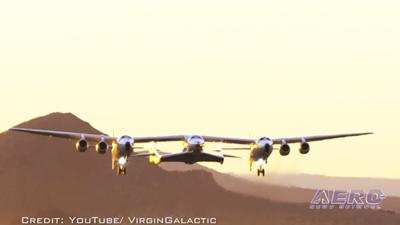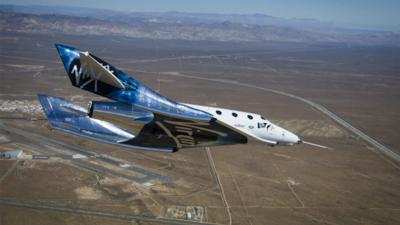Branson’s Space Tourism Dream Remains Alive
Virgin Galactic—the California-based spaceflight subsidiary of archetypal billionaire-cool-guy-knight Sir Richard Branson’s Virgin Group—resumed flight-testing of its VSS Unity spacecraft on Wednesday, 26 April 2023.

The non-powered, gliding test-flight occasioned the first instance in which Unity has flown independently of a carrier aircraft since July 2021, when the unique vessel rocketed Branson and Virgin Galactic employees Beth Moses, Sirisha Bandla, and Colin Bennett to an altitude of approximately 278,900-feet—albeit not without consequence.
The Wednesday morning flight departed Virgin Galactic’s Spaceport America—an FAA-licensed spaceport situated on 18,000 acres of state trust land some twenty-miles southeast of Truth or Consequences, New Mexico. Unity—which resembles, more-or-less, the aftermath of a Hawker 800 landing atop a Beech Starship—was borne aloft by Virgin Mother Ship (VMS) Eve, a Burt Rutan-designed, Scaled-Composites-built, four-engined, twin-fuselage, twin-empennage behemoth named for Evette Branson, Sir Richard’s mother. Upon attaining an altitude of approximately FL460, Eve released Unity from an underwing hardpoint between the larger aircraft’s twin-fuselages, allowing company pilots C.J. Sturckow and Nicola Pecile to glide the space-plane back to Spaceport America, where it landed without incident.
Virgin Galactic president of spaceline missions Mike Moses stated: “Releasing Unity for a glide flight today is one of the final steps towards commercial spaceline operations. The data from this validation flight will clear the way for our return to space and, ultimately, lead to the launch of commercial service.”
The next step for Virgin Galactic will be a powered test-flight of VSS Unity during which, according to Virgin Galactic, four company mission specialists will join two pilots in “assessing the customer experience and ground-based training.” Virgin has yet to disclose a date for the powered flight, setting forth only that its personnel, “over the coming weeks,” will analyze data gathered during the non-powered flight prior to clearing Unity for a suborbital spaceflight.
In 2004, Branson somewhat prematurely declared Virgin Galactic’s first paying passengers would journey spaceward in 2007. Fourteen years thereafter, Virgin Galactic made the aforementioned 2021 inaugural flight, which, unbeknownst to many, drifted off-course, compelling the mission’s pilots to heroic feats of airmanship by which an embarrassing emergency landing was precluded—just—and Branson et al. returned safely, if not a bit shaken, to Earth.
An FAA investigation of the narrowly-averted debacle turned up a structural weakness in Eve’s wing, near the point at which Voyager (Unity’s former designation) anchored to the mothership. The findings prompted the FAA to ground Virgin Galactic flight operations pending resolution of Eve’s wing woes. The process of reengineering, refabrication, and retrofit spanned 18 months.
In July 2022, Virgin Galactic announced the signing of a long-term lease for a new final-assembly manufacturing facility for its next-generation Delta class spaceships, which are slated to serve as the company’s workhorse vehicle for near-future spaceflight operations. The first Delta class ships are expected—perhaps over-optimistically—to commence revenue-generating payload flights in late 2025 before progressing to passenger-carrying space tourism flights in 2026.

In the near-term, Virgin Galactic aims to fly Unity once a month, a tempo dramatically largo of profitability but enough, the company’s hopes, to sustain investors and cash-flow until the debut of the Delta class ships—which Virgin Galactic asserts will be capable of undertaking weekly revenue spaceflights.
Provisioned with a fleet of Delta class ships, Branson and his faithful believe the company can maintain a profitable cadence of four-hundred yearly space missions.
Passenger flights aboard Virgin Galactic’s Delta class are expected to sell for an eye-watering $450,000 per-seat. Customers will be required to make an initial deposit of $150,000—about $25,000 of which is nonrefundable—to hold their respective spots.
Notwithstanding Branson’s confidence in his company’s business model, investors have grown increasingly skeptical of Virgin Galactic’s profit-turning potential. In 2021, following Branson’s publicity-stunt flight, the publicly-traded company’s stock shot to $55.91 per-share. In 2022, however, after flying no customers to space, the company reported a net loss of $500-million.
Currently, Virgin Galactic stock is trading just above $3 per-share.
 ANN's Daily Aero-Linx (12.12.25)
ANN's Daily Aero-Linx (12.12.25) ANN's Daily Aero-Term (12.12.25): Land And Hold Short Operations
ANN's Daily Aero-Term (12.12.25): Land And Hold Short Operations ANN FAQ: How Do I Become A News Spy?
ANN FAQ: How Do I Become A News Spy? NTSB Final Report: Cirrus Design Corp SF50
NTSB Final Report: Cirrus Design Corp SF50 Airborne 12.08.25: Samaritans Purse Hijack, FAA Med Relief, China Rocket Fail
Airborne 12.08.25: Samaritans Purse Hijack, FAA Med Relief, China Rocket Fail




